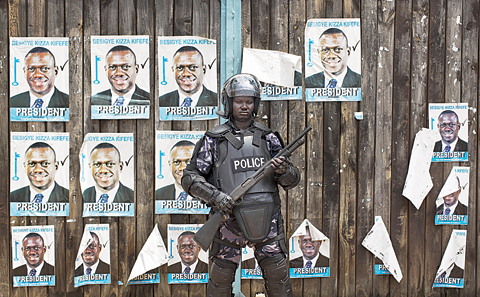 KAMPALA: A Ugandan riot policeman blocks the gate of the party headquarters of opposition leader Kizza Besigye, shortly after raiding the premises for the second time in a week, in the capital Kampala yesterday. —AP
KAMPALA: A Ugandan riot policeman blocks the gate of the party headquarters of opposition leader Kizza Besigye, shortly after raiding the premises for the second time in a week, in the capital Kampala yesterday. —APKAMPALA: Police arrested Uganda's main opposition leader, Kizza Besigye, for the fourth time in eight days yesterday, after an election that the United States and European Union have criticised and the opposition reject as fraudulent.
Police also stormed Besigye's Forum for Democratic Change (FDC) party headquarters and arrested eight people, one member said, two days after President Yoweri Museveni, 71 and in power for 30 years, was declared the winner of the Feb. 18 vote.
The EU observer mission said the vote had been conducted in an "intimidating" atmosphere and United States has voiced concerns about the frequent arrests of Besigye.
Police said they detained Besigye as he was preparing to lead supporters to the Electoral Commission headquarters in the capital Kampala to collect the official results, and that he had not obtained government consent. "We have arrested people who are planning to cause violence in Kampala city centre," police spokesman, Patrick Onyango, said.
But Ingrid Turinawe, a senior FDC official, said Besigye was attempting to gather evidence as part of his challenging of the election result.
A second FDC official said that police had raided party headquarters, confiscating documents and arresting eight people. Museveni has presided over strong economic growth but is accused at home and abroad of repression of dissent and failing to tackle rampant corruption.
Critics say he wants to rule for life, emulating other African leaders who refuse to give up power. On Friday, US Secretary of State John Kerry called Museveni to voice concern over the harassment of opposition figures and the shutdown of social media in Uganda, where Facebook, Twitter and WhatsApp were blocked on election day.
Museveni said he told Kerry "not to worry" about Uganda's election and dismissed EU accusations that electoral commission had favoured him and his National Resistance Movement (NRM).
"I told those Europeans ... I don't need lectures from anybody," Museveni told reporters in his country home in Kiruhura, southwestern Uganda. Museveni last clashed with Western donors in 2014, when Uganda passed a law that imposes harsh penalties on homosexuality. In response, donors cut aid, but largely restored it later when the law was repealed by a Ugandan court.
Questions about the election's fairness puts Western donors in an awkward position: Museveni, an important ally in the region, is leading mediation to end conflict in Burundi and contributes 5,000 Ugandan troops to the African Union force in Somalia that has brought a measure of stability to the country. Stephanie Wolters, an analyst at the Institute for Security Studies, said of the criticism from Western powers was "the kind of stuff that the international community has to say".
"I don't think it's going to translate into longer-term criticism of the Museveni government, or any kind of significant shift in how donors interact with that country," she said. - Reuters









